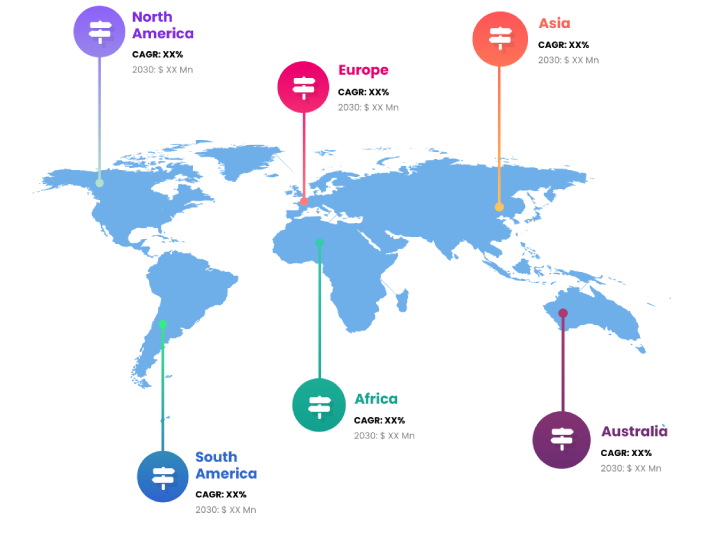
The leisure tourism sector around the world is expanding significantly. It provides a wide variety of amenities and entertainment options so that visitors can relax and have fun throughout their stay. This industry was expanding significantly until the COVID-19 epidemic hit. This was because people in the middle class had more disposable income, leading to a bigger demand for extravagant trips.
The epidemic, however, cut short this time of expansion. Foreign visitors to the market dropped dramatically. Due to travel restrictions and border closures, the leisure travel market shrank. Now that domestic tourists are contributing, the market is beginning to recover. International tourism has taken a backseat in the redesigned industry. Many tourists today are looking for places to visit that offer a variety of outdoor activities close to home. Strict health regulations also set limits on the market's expansion. Health and safety concerns have resulted in stricter regulations.
The market for vacation trips has also been seized by technological innovations. The market has been revolutionized by the prevalence of mobile apps and digital hubs. In order to meet rising consumer demand, the travel industry is turning to digital marketing travel techniques. To lessen their negative effects on the environment, vacationers are increasingly looking for eco-friendly vacation options. Additionally, new subsets of consumers have entered the leisure travel sector. Among these are visits to historical sites, spas, and other places of cultural significance. As travelers strive for immersive and authentic experiences, this niche category is getting increasingly popular. The advent of telecommuting has sparked a new fad known as "workcations," in which workers take vacations while still fulfilling their professional obligations.
Logistics, lodging, food and beverage, retail, entertainment and other tourism-related businesses, and so on are all vital parts of the leisure travel economy. Both large and small businesses in the related industries work tirelessly to provide experiences that unite people, strengthen communities, and improve national economies. When governments and businesses put in a lot of money to promote tourism, it has a domino effect on the economy that benefits everyone. tourist's impressive recent expansion has caught the eye of tourist development specialists, policymakers, and industry leaders, particularly in the developing countries of Asia-Pacific and Africa, due to the positive effects it may have on a country's economy.
The leisure travel market has been divided based on traveler type, sales channel, age group, expenditure type and geography. The leisure travel industry is segmented into the solo and group segments, respectively. The global market is broken down into "traditional" and "online" sales channels for analysis. Baby boomers, Gen Xers, Millenials, and Z-ers are the several age groups that make up this population. The market is broken down into distinct subsets based on the main types of consumer spending involved, such as lodging, transportation, food & beverage, activities & entertainment, and others. The market is analyzed globally across the regions of North America, Europe, Asia-Pacific, and the Middle East and Africa.
The leisure travel industry is undergoing a dramatic shift due to a key market trend. The trend now is to try out new kinds of travel. Modern tourists are looking for genuine, one-of-a-kind adventures. They like doing this over visiting well-known landmarks all across the globe. This development has led to the emergence of novel tourism options. Among these are ecotourism, gastronomic tourism, and cultural immersion trips. Tourists want to learn about and experience the local cultures they visit. This has resulted in pursuits such as learning about the local culture and people and sampling the cuisine. Travel businesses have included more experiential-focused packages in their product offering to attract individuals obsessed with experiential travel. To meet this need, we've packed these deals full of the above activities.
The leisure travel market has been disrupted by technology. Customers prefer the ease of making travel arrangements and purchases online. Smartphone travel apps and online travel agency websites have seen significant growth in recent years. This is due to the convenience of being able to look up information on a destination, book a room and flights, compare costs, and organize a trip all in one spot. This expanding pattern has been helped along by many online services. When planning a journey, internet users are looking for more streamlined and individualized experiences. As technology improves, this trend will only grow further.
Report Coverage
Global Leisure Travel research report categorizes the market for global based on various segments and regions, forecasts revenue growth, and analyzes trends in each submarket. Global Leisure Travel report analyses the key growth drivers, opportunities, and challenges influencing the global market. Recent market developments and Leisure Travel competitive strategies such as expansion, product launch and development, partnership, merger, and acquisition have been included to draw the competitive landscape in the market. The report strategically identifies and profiles the key Leisure Travel market players and analyses their core competencies in each global market sub-segments.
| REPORT ATTRIBUTES | DETAILS |
|---|---|
| Study Period | 2017-2030 |
| Base Year | 2022 |
| Forecast Period | 2022-2030 |
| Historical Period | 2017-2021 |
| Unit | Value (USD Billion) |
| Key Companies Profiled | Marriott International, Inc. (USA), Accor S.A. (France), Ctrip.com International Ltd. (China), InterContinental Hotels Group (IHG) (UK), Expedia Group, Inc. (USA)The Priceline Group, Inc. (USA), Hilton Worldwide Holdings Inc. (USA), American Express Global Business Travel (USA), Booking Holdings Inc. (USA), TripAdvisor, Inc. (USA), Airbnb, Inc. (USA), Royal Caribbean Group (USA), Norwegian Cruise Line Holdings Ltd. (USA), Qantas Airways Limited (Australia), Delta Air Lines, Inc. (USA), Lufthansa Group (Germany), Air Canada (Canada), Turkish Airlines (Turkey), Emirates Group (United Arab Emirates), Singapore Airlines Limited (Singapore), China Southern Airlines Co., Ltd. (China), Carnival Corporation & plc (USA), LATAM Airlines Group S.A. (Chile), Japan Airlines Co., Ltd. (Japan), ANA Holdings Inc. (Japan) |
| Segments Covered | • By Product |
| Customization Scope | Free report customization (equivalent to up to 3 analyst working days) with purchase. Addition or alteration to country, regional & segment scope |
Key Points Covered in the Report
- Market Revenue of Leisure Travel Market from 2021 to 2030.
- Market Forecast for Leisure Travel Market from 2021 to 2030.
- Regional Market Share and Revenue from 2021 to 2030.
- Country Market share within region from 2021 to 2030.
- Key Type and Application Revenue and forecast.
- Company Market Share Analysis, Leisure Travel competitive scenario, ranking, and detailed company
profiles. - Market driver, restraints, and detailed COVID-19 impact on Leisure Travel
Market
Competitive Environment:
The research provides an accurate study of the major organisations and companies operating in the global Leisure Travel market, along with a comparative evaluation based on their product portfolios, corporate summaries, geographic reach, business plans, Leisure Travel market shares in specific segments, and SWOT analyses. A detailed analysis of the firms' recent news and developments, such as product development, inventions, joint ventures, partnerships, mergers and acquisitions, strategic alliances, and other activities, is also included in the study. This makes it possible to assess the level of market competition as a whole.
List of Major Market Participants
Marriott International, Inc. (USA), Accor S.A. (France), Ctrip.com International Ltd. (China), InterContinental Hotels Group (IHG) (UK), Expedia Group, Inc. (USA)The Priceline Group, Inc. (USA), Hilton Worldwide Holdings Inc. (USA), American Express Global Business Travel (USA), Booking Holdings Inc. (USA), TripAdvisor, Inc. (USA), Airbnb, Inc. (USA), Royal Caribbean Group (USA), Norwegian Cruise Line Holdings Ltd. (USA), Qantas Airways Limited (Australia), Delta Air Lines, Inc. (USA), Lufthansa Group (Germany), Air Canada (Canada), Turkish Airlines (Turkey), Emirates Group (United Arab Emirates), Singapore Airlines Limited (Singapore), China Southern Airlines Co., Ltd. (China), Carnival Corporation & plc (USA), LATAM Airlines Group S.A. (Chile), Japan Airlines Co., Ltd. (Japan), ANA Holdings Inc. (Japan)
Primary Target Market
- Market Players of Leisure Travel
- Investors
- End-users
- Government Authorities
- Consulting And Research Firm
- Venture capitalists
- Third-party knowledge providers
- Value-Added Resellers (VARs)
Market Segment:
This study forecasts global, regional, and country revenue from 2019 to 2030. INFINITIVE DATA EXPERT has segmented the global Leisure Travel market based on the below-mentioned segments:
Global Leisure Travel Market, By Traveler Type
SOLO
GROUP
Global Leisure Travel market, By Sales Channel
CONVENTIONAL CHANNELS
ONLINE CHANNELS
Global Leisure Travel Market, By EXPENDITURE TYPE
Lodging
Transportation
Food & beverages
Events & entertainment
Others
Global Leisure Travel market, Regional Analysis
- Europe: Germany, Uk, France, Italy, Spain, Russia, Rest of Europe
- The Asia Pacific: China,Japan,India,South Korea,Australia,Rest of Asia Pacific
- South America: Brazil, Argentina, Rest of South America
- Middle East & Africa: UAE, Saudi Arabia, Qatar, South Africa, Rest of Middle East & Africa
You will get in-depth and extensive leisure travel market market research and competitor analysis for your business to help you develop more profound insights into the leisure travel market Market.
Through INFINITIVE Data Expert is a professional Market Research services, I will identify the leisure travel market market size, demand & opportunities, growth rate, and target audience with a comprehensive analysis of your competitors.



